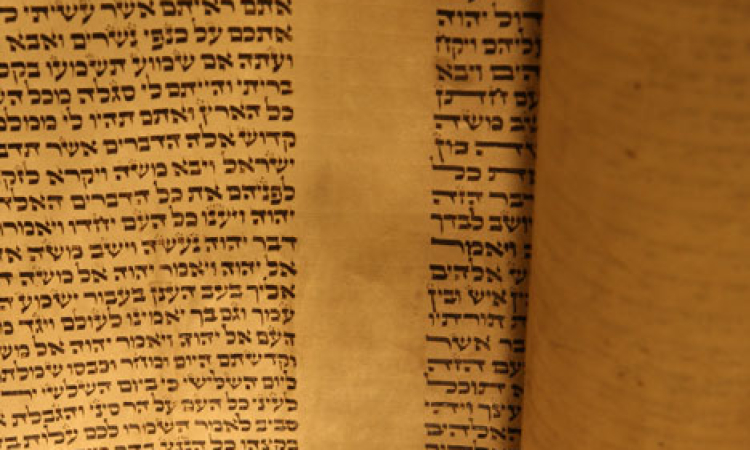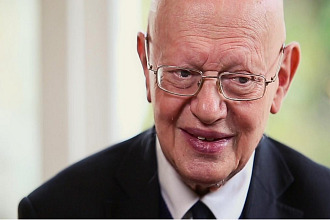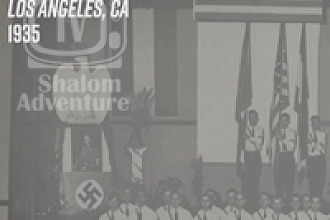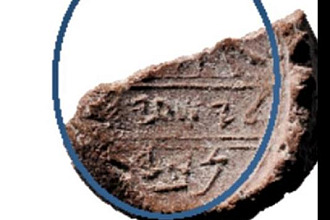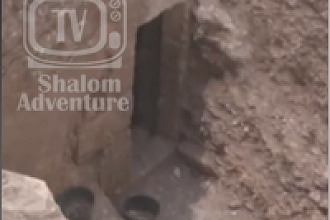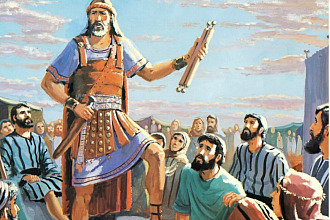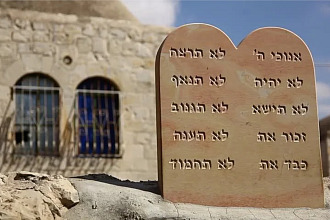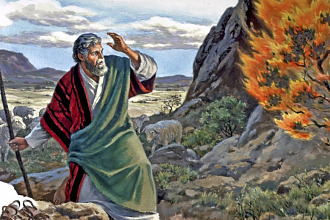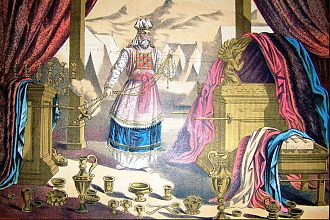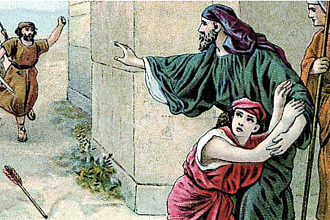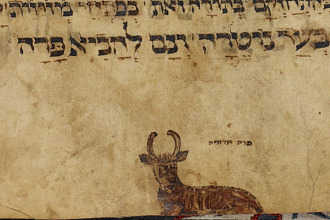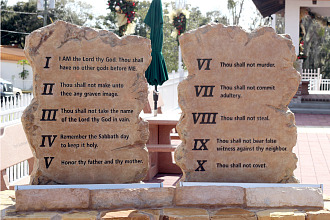Parasha for the Week: Vayechi: Genesis 47: 28 – 50:26
Haftarah for the Week: 1 Kings 2:1 - 12
Apostolic Writings: Revelation 21:1 - 21
Overview
After 17 years in Egypt, Yaakov calls Yosef. He has Yosef swear to bury him in the Machpela Cave, the burial place of Avraham and Sara, Yitzchak and Rivka. Yaakov falls ill and Yosef brings to him his two sons, Ephraim and Menashe. Yaakov elevates Ephraim and Menashe to the status of his own sons, thus giving Yosef a double portion that removes the status of firstborn from Reuven.
As Yaakov is blind from old age, Yosef leads his sons close to their grandfather.
Yaakov begins to bless them, giving precedence to Ephraim, the younger, but Yosef interrupts him and indicates that Menashe is the elder. Yaakov explains that he intends to bless Ephraim with his strong.
Yaakov summons the rest of his sons to bless them. Yaakov's blessing reflects the unique character and ability of each tribe, directing each one in its unique mission in serving G-d.
Yaakov dies at age 147. A tremendous procession accompanies his funeral cortege up from Egypt to his resting place in the Cave of Machpela in Hebron.
After Yaakov's passing, the brothers are concerned that Yosef will now take revenge on them. Yosef reassures them, even promising to support them and their families.
Yosef lives out the rest of his years in Egypt, seeing Ephraim's great-grandchildren. Before his death, Yosef foretells to his brothers that G-d will redeem them from Egypt.
He makes them swear to bring his bones out of Egypt with them at that time.
Yosef passes away at the age of 110 and is embalmed.
Thus ends Sefer Bereshit, the first of the five Books of the Torah.
"Good Deeds Of The Righteous"
In the beginning of this week’s parasha, which is called Vayechi Yaakov and means “ ‘and Yaakov lived’ in the land of Egypt seventeen years.” (Genesis 47:28a). we read about the last seventeen years of Yaakov’s life. The Parasha tells us about the blessings which Yaakov gave to his grandchildren and to his children.
Indeed, Yaakov called his son Yosef and said that he does not want to be buried in Egypt. He made Yosef promise to bury him with his forefathers, Abraham and Yitzchak, in the Me’arat Hamachpeilah in Hebron. Although the Parasha is called Vayechi — It actually is about the passing of Yaakov. For the good deeds of the righteous never die, but live on through the memory of their children and disciples till the last resurrection at the coming of the Mashiach. At the end of the Parasha, the Torah describes in great detail the honor given to Yaakov after his passing away as he was carried from Egypt to the family burial plot that can be visited today in Hebron.
"Yaakov’s Request"
During the years of his living in Egypt, Yaakov did not want to embarrass his son, Yosef. He did not want to be the “father of the Prime Minister”, but now as he arrives at the end of his life, he accepted, he wanted to use Yosef’s influence and said to him “If now I have found favor in your sight,” (Genesis 47:29), it is not how a father would speak to his son, nor even how a son would speak to his father. Yosef, in his great devotion for his father wished to use his exalted position to grant his father exceptional privilege, but Yaakov was never willing to accept them. However, now Yaakov said to Yosef, if you wish to do me a special favor, then grant me this request: “put your hand under my thigh and promise to deal kindly and truly with me. Do not bury me in Egypt, but let me lie with my fathers. Carry me out of Egypt and bury me in their burying place.” (Genesis 47:29–30). Yaakov knows very well that Yosef would bury his father with pomp and splendor. But he tells him: For all your Chesed “love” do not lose sight of Emet “truth”. I would rather not be buried at all than be buried in Egypt. The stress is on his request that he not be buried in Egypt. As Rabbi Hirsch put it “One would have thought that he fulfillment of such a request would not be so difficult that it should require such a solemn oath.” But from the whole story it appears that Pharaoh and the Egyptians would not have taken it kindly had Yaakov and his family left and emigrated from Egypt. So too, the transfer of Yaakov’s remains to Canaan would not make a good impression; it would clearly show that Yosef’s family still did not consider themselves citizens of the land, and that they were still emotionally attached to their former country.
However, Rabbi Hirsch says that the motivation of Yaakov should have been more profound than that. He said that during the seventeen years that he lived in Egypt, Yaakov surely must have noted the powerful influence of their “possession” (Gen 47:27) on his descendants; he must have seen that they had begun to regard the Nile as their Jordan, that they had ceased to regard their stay in Egypt as an exile. This was indeed sufficient reason for Yaakov’s solemn entreaty that they should not bury him in Egypt, but should carry him to their true homeland.
It was sufficient reason for him to say to them: “You may hope and wish to live in Egypt, but I do not even want to be buried there” This is why says Rabbi Hirsch “he expressed his request not as Yaakov, from a private and personal standpoint, but as Yisrael, a bearer of the national destiny, as a warming for the national future of his children.”
"Joy And Bible Study"
Another interpretation of Genesis 49:12) is associated in the Jewish tradition with simcha “Joy,” since it is when we smile that we show our white teeth. The sages of Israel have also associated joy with the study of Torah because discovering truth in Torah gives true simcha. A person immersed in Torah and Torah study possesses a repository of happiness which not only fills his or her life, but can be shared with others. Such a person is able to be greater than the milkman. Those who study the Bible often make the best therapists, because they have deep, spiritual insights to offer, reaching into eternal wisdom for an understanding of human nature. And because they have “stocked up” on happiness, troubles shared by others cannot overwhelm and defeat them.
But the Torah is for everyone, and affects everyone. In Psalm 119, King David wrote, “had your Torah not been my comfort, I would have perished in my affliction.” At the lowest of times, Jews for thousands of years have turned to Torah for the spiritual fortitude and well-being which our generation so sorely needs.
HAFTARAH: 1 Kings 2:1 - 12
Parasha: Yaakov is dying and gives his last in¬structions to Yosef and other sons: [Yaakov] blessed Joseph, and said, "The God before whom my ancestors Abraham and Isaac walked, the God who has been my shepherd all my life to this day, the angel who has redeemed me from all harm, bless the boys; and in them let my name be perpetuated, and the name of my ancestors Abraham and Isaac; and let them grow into a multitude on the earth." (Gen. 48:15-16)
Haftarah: There is a parallel between Yaakov dying and King David dying and giving instruction to Sol¬omon his son: " When David's time to die drew near, he charged his son Solomon, saying: "I am about to go the way of all the earth. Be strong, be courageous, and keep the charge of the LORD your God, walking in his ways and keeping his statutes, his commandments, his ordinances, and his testimonies, as it is written in the law of Moses, so that you may prosper in all that you do and wherever you turn. Then the LORD will establish his word that he spoke concerning me: 'If your heirs take heed to their way, to walk before me in faithfulness with all their heart and with all their soul, there shall not fail you a successor on the throne of Israel...' Then David slept with his ancestors, and was buried in the city of David."
Besorat Yeshua Mark 13:32 – 14:9
Parasha: Yaakov is dying. "Now the eyes of Israel were dim with age, and he could not see well. So Joseph brought them near him; and he kissed them and embraced them." (Gen. 48:10).
Besorah: In the parasha Yaakov, just before dying gave some prophecy about the future of God's people through his sons, Yeshua does the same, he will die very soon, and gave a prophecy for the future of his people: "It is like a man going on a journey, when he leaves home and puts his slaves in charge, each with his work, and commands the doorkeeper to be on the watch. Therefore, keep awake—for you do not know when the master of the house will come, in the evening, or at midnight, or at cockcrow, or at dawn, or else he may find you asleep when he comes suddenly. And what I say to you I say to all: Keep awake."
In the parasha Yosef demonstrated kindness to his brothers even after the death of his father, there is a woman in the text of the Besorah who demonstrated kindness to Yeshua before he dies, her name was Myriam. "...as he sat at the table, a woman came with an alabaster jar of very costly ointment of nard, and she broke open the jar and poured the ointment on his head. ...Y'shua said, "She has performed a good service for me. For you always have the poor with you, and you can show kindness to them whenever you wish; but you will not always have me.

